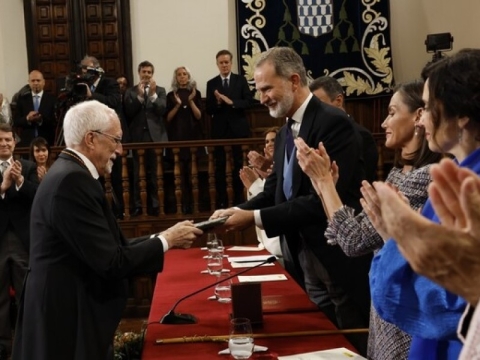Arts
The Kings of Spain present the Cervantes prize to Luis Mateo Diez
The most important in Spanish language
USPA NEWS -
The King of Spain, Felipe VI, and Queen Letizia presented on Tuesday the 2023 ‘Miguel de Cervantes’ Literature Prize in the Spanish Language to Luis Mateo Diez, awarded by the Ministry of Culture, endowed with 125,000 euros. Upon his arrival to the auditorium of the University of Alcala de Henares in Madrid, the King and Queen were received by the President of the Government, Pedro Sánchez, and the Chief of the Defense Staff, Teodoro Esteban Lopez Calderon, among other authorities. After receiving the Military Honors, the King reviewed the troops, and then headed with the Queen towards the entrance of the University.
The King and Queen took their place at the presidential table, where at the beginning the National Anthem was performed by the Ciudad de Alcala Orchestra. Next, the King opened the session and successively gave the floor to the Minister of Culture, the General Director of Books, Comics and Reading, who read the award document for the award and the 2023 Cervantes Prize.
The event continued with the intervention of the King, who highlighted that "today we celebrate, not only the festival of books and letters in Spanish. We honor the figure of our illustrious Miguel de Cervantes. And we recognize the work and career -and I quote verbatim from the jury report- of “one of the great narrators of the Spanish language, heir to the Cervantes spirit, writer in the face of all adversity, creator of imaginary worlds and territories.” Today we recognize Luis Mateo Diez. to the Cervantine relationship of the best writers of the Spanish language". Finally, the King adjourned the session, after which the ‘Gaudeamus Igitur’ was performed by the Choir of the University of Alcala de Henares.
The jury has awarded the prize to Luis Mateo Diez for “being one of the great storytellers of the Spanish language, heir to the Cervantine spirit, writer in the face of all adversity, creator of imaginary worlds and territories.”
“With prose, sagacity and a style that make him unique in the literary consideration of the highest flight, Luis Mateo Diez surprises and offers continuous and new challenges with which he goes beyond the realm of fantasy and acquires reality in readers, who they appropriate their creative universe. In his creations, his expertise and indisputable mastery of language stand out, which the author accredits in a writing in which he masterfully mixes the cultured and the popular. A style of his own, demanding, of great originality, where expressionistic, parodic or grotesque humor prevails as the best way to relativize what happens, and which entails a lucid and ambiguous perspective that allows us to verify the complexity of the human condition," he acknowledged. the judge.
The jury was chaired by Santiago Muñoz Machado, representative of the Royal Spanish Academy. María José Gálvez, general director of Books, Comics and Reading of the Ministry of Culture and Sports, has acted as vice president.
Luis Mateo Díez (León, 1942) is one of the most prolific writers on the Spanish literary scene. In addition to his two poetic books, he has a narrative, autobiographical and essayist work that has been the subject of important narrative awards. Twice the Critics Award and the National Narrative Award, the Francisco Umbral Award and the Cafe Gijon Award, among others. In 2020 he was awarded the National Prize for Spanish Letters.
Among his most notable works are “The Provincial Stations” (1982), “The Fountain of Age” (1986), the stories collected in “Brasas de August”, “The Complete Hours” (1990), “The File of the castaway” (1992), “The Spirit of the Páramo” (1996), the autobiographical “Days of the Attic” (1997), the essay “The Future of Fiction” (1999), the stories “The Lessons of Things” ( Miguel Delibes Award 2004) or the more than eighty stories collected in “Vicissitudes” (2018). His latest novels are “The Sidereal Elders” from 2020 and “My Crimes as a Pet” from 2022.
By granting this prize, endowed with 125,000 euros, public testimony of admiration is paid annually to the figure of a writer who, with his or her work as a whole, has contributed to enriching the Hispanic literary legacy. Any author whose literary work is written entirely, or in essential part, in Spanish can be awarded the Cervantes Prize. Candidates for the Prize can be presented by the Academies of the Spanish Language, the authors awarded in previous calls, the institutions that, due to their nature, purposes or content, are linked to literature in the Spanish language and the members of the Jury.
Liability for this article lies with the author, who also holds the copyright. Editorial content from USPA may be quoted on other websites as long as the quote comprises no more than 5% of the entire text, is marked as such and the source is named (via hyperlink).






